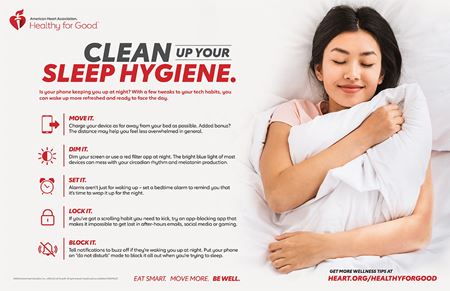Life’s Essential 8™ - How to Get Healthy Sleep Fact Sheet
Getting a good night’s sleep every night is vital to your heart and brain health.
Adults should aim for an average of 7-9 hours.
Babies and kids need more depending on their age.
Learn the Benefits of Sleep
- Better brain function including alertness, decision-making, focus, learning, memory, reasoning and problem-solving
- Improved mood and energy
- Stronger immune system
- Healing and repairing of cells, tissues and blood vessels
- Less risk of chronic disease
Learn How Sleep Affects Your Health
Sleep is an important time for your brain to reset. Regular, restful sleep is important to keep your brain running smoothly. Poor sleep may put you at higher risk for:
- Depression and anxiety
- Memory loss and dementia
- High blood pressure, blood sugar and cholesterol
- Obesity
- Heart disease
Tips For Success
Clean your room.
- Dim it. Dimming the lights before sleep helps signal to your brain that it’s time to wind down. Dim your screen or use a red filter app at night. The bright blue light of most devices can mess with your “internal clock” and melatonin production, a hormone that regulates sleep.
- Set it. Go to bed and wake up at the same time every day. This helps regulate your body’s internal clock and makes it easier to fall asleep and wake up naturally. Set a bedtime alarm to remind you it’s time to wrap it up for the night.
- Create it. Establish a nighttime routine. Spend 20-30 minutes winding down before bed, such as reading, meditating, or taking a warm bath. Avoid screens.
- Block it. Put your phone on “do not disturb” mode to block it all out when you’re trying to sleep.
View or Download Fact Sheet
How to Get Healthy Sleep (PDF)
This fact sheet is also available in the following languages:
- How to Get Healthy Sleep - Arabic (PDF)
- How to Get Healthy Sleep - Chinese Simplified (PDF)
- How to Get Healthy Sleep - Chinese Traditional (PDF)
- How to Get Healthy Sleep - French (PDF)
- How to Get Healthy Sleep - Haitian Creole (PDF)
- How to Get Healthy Sleep - Hindi (PDF)
- How to Get Healthy Sleep - Korean (PDF)
- How to Get Healthy Sleep - Navajo (PDF)
- How to Get Healthy Sleep - Portuguese (PDF)
- How to Get Healthy Sleep - Russian (PDF)
- How to Get Healthy Sleep - Spanish (PDF)
- How to Get Healthy Sleep - Tagalog (PDF)
- How to Get Healthy Sleep - Vietnamese (PDF)
How to Get Healthy Sleep Resources
Life's Essential 8 Fact Sheets
- Life’s Essential 8 - How to Eat Better Fact Sheet
- Life's Essential 8 - How to Be More Active Fact Sheet
- Life's Essential 8 - How to Quit Tobacco and Nicotine Products Fact Sheet
- Life's Essential 8 - How to Get Healthy Sleep Fact Sheet
- Life's Essential 8 - How to Keep a Healthy Weight Fact Sheet
- Life's Essential 8 - How to Control Cholesterol Fact Sheet
- Life’s Essential 8 - How to Manage Blood Sugar Fact Sheet
- Life’s Essential 8 - How to Manage Blood Pressure Fact Sheet




